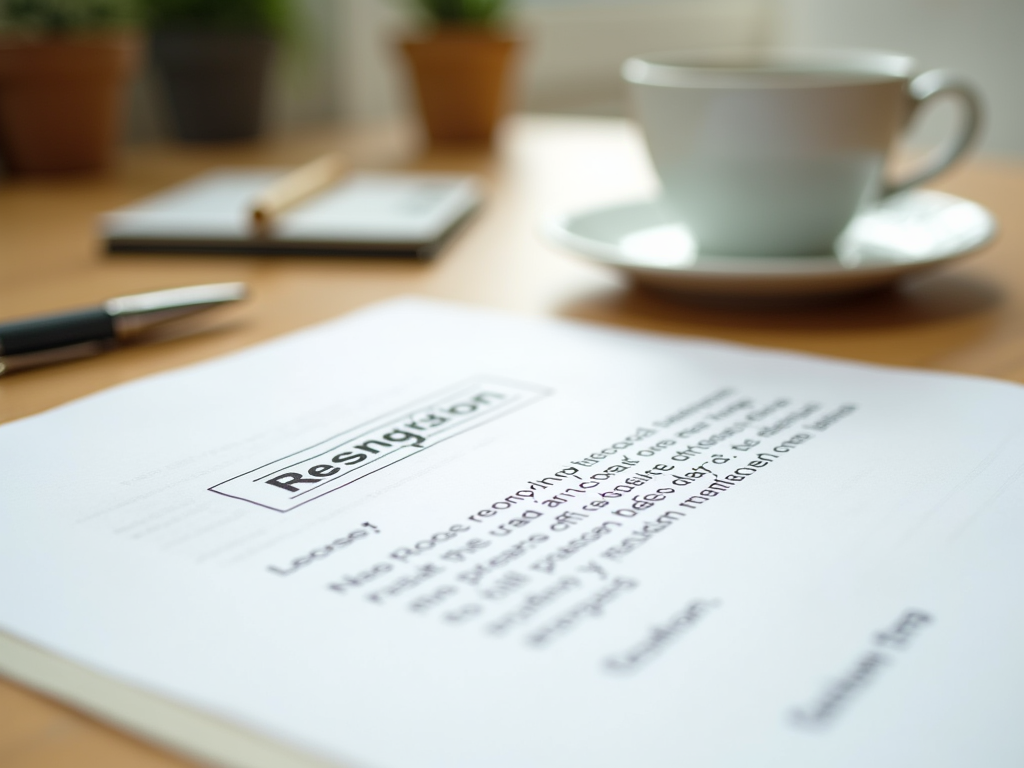
Stepping away from a job can be a daunting task, especially when it comes to delivering the message in a respectful and professional manner. Whether you are moving on to a new opportunity or stepping back for personal reasons, the resignation letter is your final word in the chapter that has been your employment. Therefore, it must reflect your professionalism and gratitude, ensuring that you leave on a positive note. Crafting the right resignation letter can influence not only how you are remembered but also preserve vital professional relationships that could benefit you in the future. In this article, we will guide you through the key aspects of writing an effective resignation letter, complete with samples and templates to make the process easier. Let’s explore the essential components you should include and tips that ensure your letter conveys the right message.
Understanding the Importance of a Resignation Letter

A resignation letter is much more than just a formality; it acts as a formal notification to your employer regarding your decision to leave the company. Submitting a well-crafted resignation letter can help maintain your professional reputation, set the stage for a smooth transition, and foster a positive relationship with your employer and colleagues. This final correspondence can also serve as a record of your departure, confirming details such as your last working day. Without this documentation, misunderstandings could arise, potentially affecting future references or professional interactions. It’s essential to give this letter the attention it deserves, as it encapsulates your overall experience at the company.
- Maintains a professional relationship with your employer.
- Protects your work reputation and opens doors for future opportunities.
- Establishes a clear record of your departure.
- Provides a platform to express gratitude and appreciation.
- Facilitates communication regarding your transition.
Key Components of a Resignation Letter

When constructing your resignation letter, ensuring it contains key components is vital for clarity and professionalism. Typically, shorter and straightforward letters maximize impact, allowing your main message to shine through. Each component plays a crucial role, forming a cohesive whole that reflects your intentions and sentiment. Here’s a breakdown of the essential elements you need to include, helping you draft a letter that hits all the right notes.
| Component | Description |
|---|---|
| Your Contact Information | Start with your name, address, phone number, and email. |
| Date of Submission | Include the date when you are submitting the letter. |
| Employer’s Information | Include the name and position of the recipient. |
| Clear Statement of Resignation | Specify your intent to resign and your final working day. |
| Gratitude | Express appreciation for the opportunities provided. |
| Transition Assistance | Mention your willingness to assist during the transition phase. |
Tips for Writing a Respectable Resignation Letter
Writing a resignation letter comes with its own set of challenges. You must navigate emotions such as sadness or relief while ensuring that your message conveys respect. Your choice of language, tone, and structure is essential for leaving a lasting impression. Maintaining an appropriate length and format also contributes to the overall effectiveness of your communication. Here are some tips to elevate your writing.
- Maintain a consistently professional tone throughout the letter.
- Keep your language clear and concise to avoid misunderstandings.
- Focus on positive aspects; this is not the place for grievances.
Samples and Templates
Providing specific examples can aid in your writing process significantly. Below are templates tailored for different circumstances that can help you formulate your letter effectively. Whether you’re resigning for a new job opportunity or due to personal reasons, having a template can streamline the process and inspire you in crafting your resignation.
Template for Standard Resignation
[Your Name][Your Address][City, State, Zip][Email][Phone Number][Date][Manager’s Name][Company’s Name][Company’s Address][City, State, Zip]Dear [Manager’s Name],I am writing to formally resign from my position at [Company Name], effective [Last Working Day]. I have enjoyed working with you and appreciate the opportunities I have received during my time here. I’m happy to assist in any way to ensure a smooth transition. Thank you for your understanding.Sincerely,[Your Name]
Template for Resignation Due to Personal Reasons
[Your Name][Your Address][City, State, Zip][Email][Phone Number][Date][Manager’s Name][Company’s Name][Company’s Address][City, State, Zip]Dear [Manager’s Name],Please accept this letter as my formal resignation from [Company Name], effective [Last Working Day]. Due to personal reasons, I have decided to step down from my position.I truly appreciate the experiences I have gained, and I am committed to helping with a smooth transition during my remaining time.Best regards,[Your Name]
Conclusion
Writing a respectable resignation letter is an essential step in ensuring a seamless transition while preserving your professional integrity. By understanding the importance of including key components and maintaining professionalism, you can leave your current role positively. Through expressing gratitude and offering transition assistance, you not only enhance your reputation but also open the door for future professional opportunities. Remember, the way you exit a situation can be just as important as how you entered it. Therefore, investing time in crafting your resignation letter pays dividends in the long run.
Frequently Asked Questions
- What should I include in my resignation letter?
Your resignation letter should include your contact information, the date, your employer’s information, a clear statement of resignation, expressions of gratitude, and an offer to assist during the transition. - How much notice should I give in my resignation letter?
The standard notice period is typically two weeks, but this may vary depending on your contract or company policy. - Can I resign via email?
Yes, you can resign via email, but it’s best to follow up with a formal letter. Always check your company’s policies regarding resignation notices. - Should I mention my reason for leaving?
While it’s not mandatory, briefly stating your reason can provide clarity, but focus on maintaining a positive tone. - Is it necessary to thank my employer in the resignation letter?
Yes, expressing gratitude helps maintain a positive relationship and leaves a good impression.